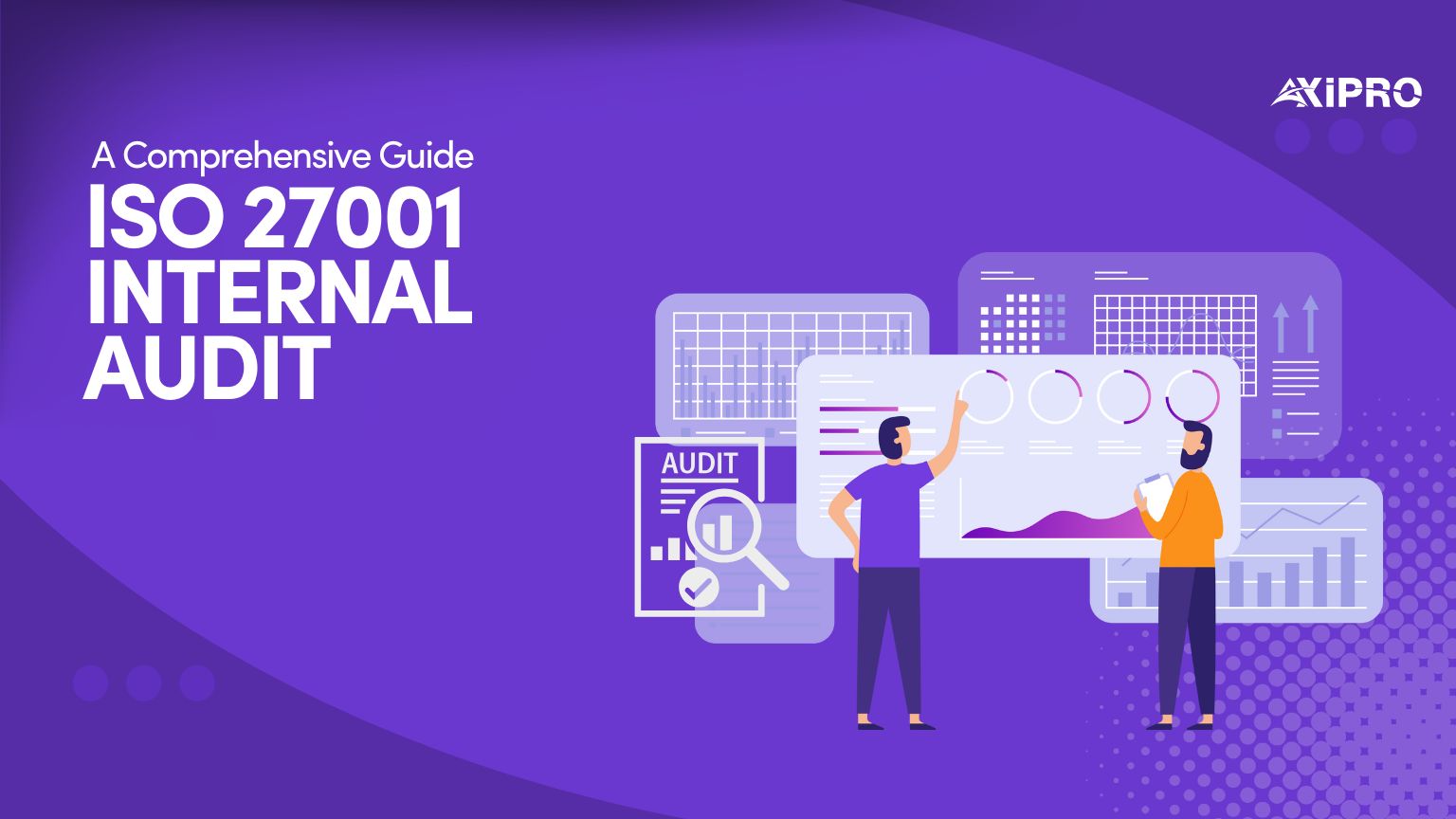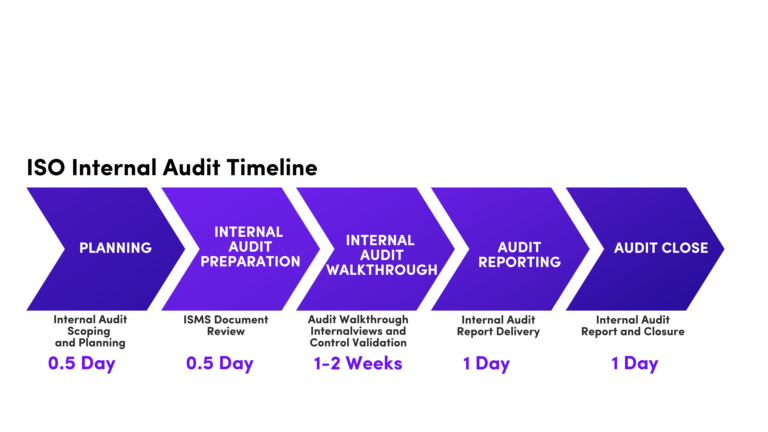
Share This Post
Watch the Loom Video for a detailed explanation of our internal audit services, check out our Loom video, where our Principal Consultant Ali Hayat breaks down the process step-by-step and shares tips for seamless ISO 27001 compliance. Click here to watch the Loom video.
Achieving ISO 27001 certification is a hallmark of excellence in information security management, showcasing your organization’s commitment to safeguarding sensitive data. However, this process involves rigorous steps, and one of the most critical is the internal audit. This essential phase ensures that your Information Security Management System (ISMS) complies with ISO 27001 standards and is robust enough to mitigate risks.
In this comprehensive guide, we’ll explore the ins and outs of the ISO 27001 internal audit, including its key steps, the importance of addressing non-conformities, and best practices for achieving certification success.
Outline
-
- What is an ISO 27001 Internal Audit?
- Who Can Perform an Internal Audit?
- Key Steps in the Internal Audit Process
- Addressing Non-Conformities
- Benefits of a Well-Executed Internal Audit
Chapter 1: . What is an ISO 27001 Internal Audit?
An ISO 27001 internal audit is a systematic review of your ISMS to evaluate its compliance with the standard’s requirements. Unlike external audits conducted by certification bodies, internal audits are carried out by the organization itself or by a third-party auditor to identify gaps, assess risks, and ensure readiness for certification.
The primary goal of an internal audit is to verify that your ISMS aligns with ISO 27001’s requirements and effectively mitigates risks. Additionally, it provides an opportunity to identify areas of improvement and reinforce your organization’s security measures.
Chapter 2: Who's Qualified to Conduct an Internal Audit?
Internal audits can be conducted by your organization’s own internal audit team or outsourced to a third-party auditor or an ISO 27001 consulting firm. Unlike external certification audits, you have the flexibility to choose the most suitable approach for your organization.
However, it’s essential to adhere to clause 9.2(e) of the ISO 27001 standard, which emphasizes the importance of selecting an internal auditor who is objective and impartial. This means avoiding any potential conflict of interest—specifically, the auditor should not have been involved in developing the ISMS or operating or monitoring any of the controls under review. The reason for this requirement is straightforward: reviewing your own work can compromise objectivity and hinder a thorough evaluation.
When selecting an auditor, ensure they are knowledgeable about auditing procedures and the ISO 27001 standard. This ensures the audit is conducted effectively, addressing all necessary compliance and performance areas. If internal expertise is limited, hiring an experienced third-party auditor or consulting firm can provide a fresh, unbiased perspective and valuable insights.
Chapter 3: Key Phases in the Internal Audit Journey
Conducting an ISO 27001 internal audit involves a series of well-defined steps to ensure that your Information Security Management System (ISMS) is thoroughly evaluated. Below is a detailed breakdown of the process:
- Determine the Scope of the Audit
The first step is to clearly outline the audit’s scope, specifying the systems, functions, people, and processes that will be assessed. This scope ensures the audit comprehensively covers all necessary areas to meet compliance objectives. Defining the boundaries early on helps the auditor focus on the most relevant elements of the ISMS.
- Documentation Review
Before proceeding with on-site evaluations, the internal auditor will review all key ISMS documents to verify that they align with ISO 27001 requirements
An effective ISMS requires a well-defined scope, a comprehensive Statement of Applicability (SoA), a robust Information Security Policy, a thorough risk assessment and treatment plan, clear definitions of responsibilities, and a detailed inventory of information assets. Additionally, identifying individuals responsible for implementing and operating controls can provide valuable insights during the audit process.
- Management Review
The audit plan must be reviewed and approved by senior management. Regular meetings should be scheduled to set expectations, discuss timelines, and maintain open communication.
Management also plays a critical role in reviewing the internal audit findings. They collaborate with the auditor to assess the organization’s readiness for an external certification audit, ensuring that all significant issues are addressed beforehand.
- Field Review
The field review is the core of the internal audit process. During this phase, the auditor evaluates the ISMS through:
- Audit Tests: Assessing controls to ensure they are effectively implemented and functioning as intended.
- Evidence Validation: Reviewing documented evidence to confirm compliance and identify gaps.
- Staff Interviews: Engaging with employees to gauge their understanding of and adherence to ISMS policies.
- Observations and Documentation: Recording findings, highlighting areas of non-conformity, and identifying strengths.
This comprehensive review enables the auditor to pinpoint what’s working well and what needs improvement.
By following these steps, the internal audit process ensures your organization’s ISMS aligns with ISO 27001 requirements and prepares you for a successful certification audit.
Chapter 4: Addressing Non-Conformities
Non-conformities can range from minor documentation gaps to critical security flaws. Identifying and addressing these issues promptly is essential to maintain the integrity of your ISMS. By developing comprehensive corrective action plans and monitoring their implementation, organizations can ensure continuous improvement and long-term compliance with ISO 27001 standards.
Chapter 5: Benefits of a Well-Executed Internal Audit
A thorough internal audit offers several advantages:
- Certification Readiness: By identifying and addressing gaps, your organization is better prepared for the certification audit.
- Improved Security Practices: Internal audits help strengthen your ISMS, reducing vulnerabilities and enhancing resilience.
- Operational Efficiency: The audit process uncovers inefficiencies, allowing you to streamline workflows and optimize resource allocation.
Stakeholder Confidence: Demonstrating robust information security builds trust with clients, partners, and regulators.
Chapter 6: Timeline of Internal Audits
A successful ISO internal audit is crucial for maintaining compliance and improving an organization’s management system. Here’s a breakdown of the key phases and estimated time required for each:
- Planning (0.5 days):
Define the audit scope, objectives, and methodology.
Develop an audit plan, including the schedule and resource allocation.
- Preparation (0.5 days):
Review relevant documentation and prepare audit checklists.
Identify key personnel to be interviewed.
- Audit Execution (1-2 weeks):
Conduct interviews, document reviews, and observations.
Verify the implementation of controls and procedures.
Identify non-conformities and opportunities for improvement.
- Reporting (1 day):
Prepare a detailed audit report, including findings, recommendations, and corrective actions. Review the report with management to ensure accuracy and completeness.
- Closure (1 day):
Finalize the audit report and distribute it to relevant stakeholders. * Monitor the implementation of corrective actions. Schedule follow-up audits to verify the effectiveness of corrective actions.

Chapter 7: Axipro’s Role in Your Compliance Journey
Axipro’s internal audit services are designed to simplify the ISO 27001 compliance process. Our team of experienced auditors conducts thorough assessments, identifying gaps and providing actionable insights to strengthen your ISMS.
We tailor our approach to your organization’s unique needs, offering guidance from planning to corrective actions. With Axipro, you can streamline your internal audit process, reduce complexity, and achieve ISO 27001 certification confidently.
Conclusion
An ISO 27001 internal audit is a cornerstone of effective information security management. It ensures compliance, enhances security practices, and prepares your organization for certification success. By following a structured approach and leveraging expert support, you can make the audit process smooth and impactful.
Simplify your ISO 27001 compliance journey with Axipro’s expert internal audit services.




